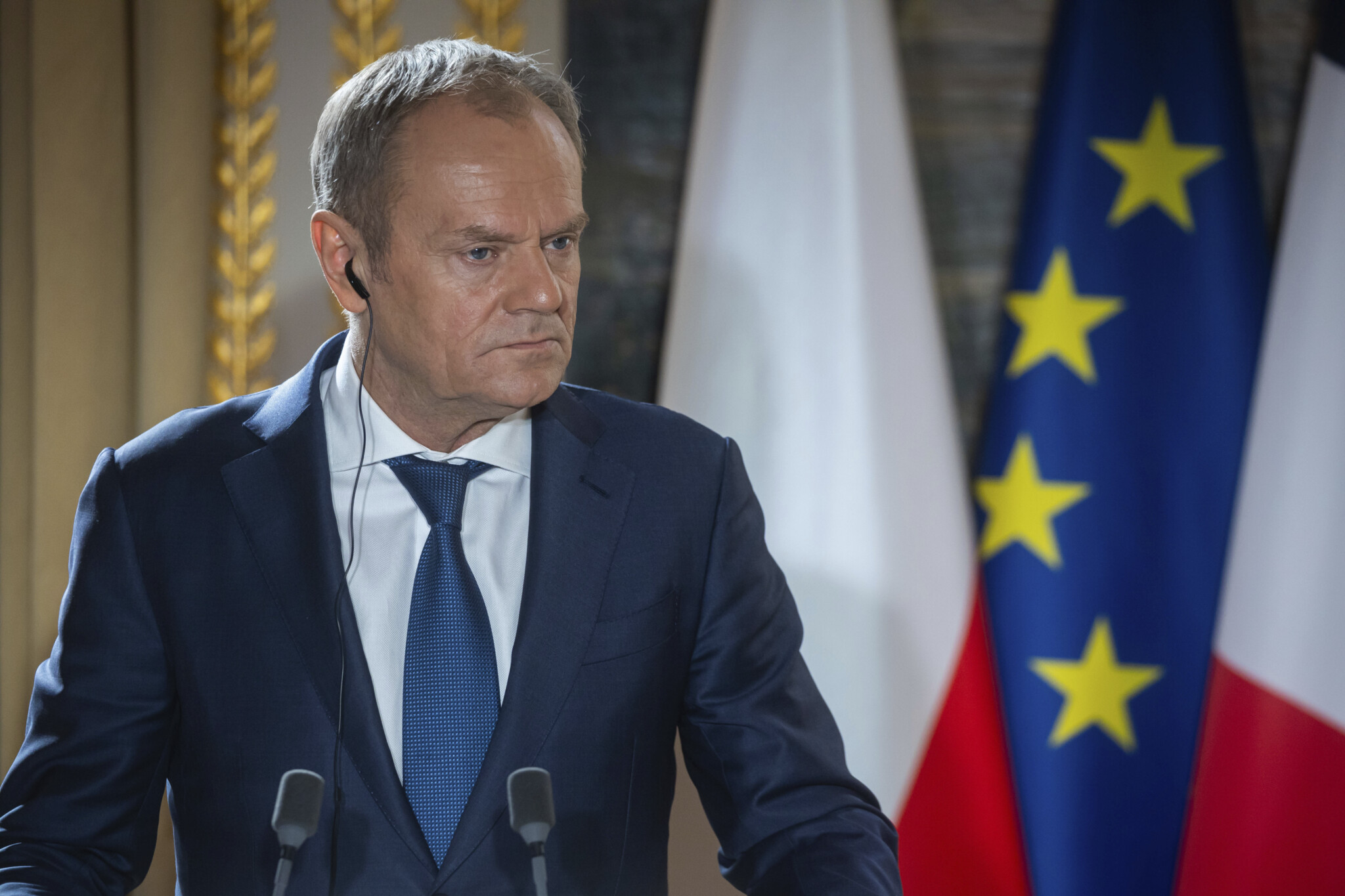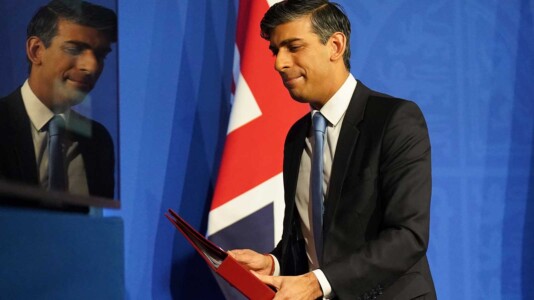There is no doubt that the current left-liberal government does not like the Ordo Iuris Institute, which is a conservative, right-wing, pro-life, pro-family, pro-sovereignty lawyers’ organization, but it seems to me that Ordo Iuris was also not very much liked by Law and Justice (PiS) when that party was in government until last fall.
This is what happens with independent organizations that build their mission based on certain ideas and principles. Regardless of who is in power, we look at them closely. This is the watchdog nature of the Ordo Iuris Institute.
We watch those in power in particular from the perspective of basic human rights. We talk about the defense of life, the family, marriage, and fundamental freedoms. And the previous government was no angel in these fields.

We repeatedly tried to push the previous nominally conservative government in the direction of full protection of life, towards emphasizing the uniqueness of marriage and certain privileges that the state should by nature inherently grant to marriage, and of protecting individual freedoms, freedom of speech, and freedom of assembly, as well as full property rights. With this, too, the previous government sometimes had problems.
However, the fact that the government of the United Right coalition led by Law and Justice could be criticized at times, from the perspective of respecting guarantees of civil rights and freedoms, does not mean that there is any symmetry in this regard with the violations we have experienced for the past three months.
Indeed, the new liberal government is bent on committing unprecedented breaches of these basic issues.
And that is why now, for obvious reasons, criticism of those in power has to be at a completely different level, for we now have a government attacking the foundations of the rule of law, often under the guise of restoring the rule of law, which only adds to the confusion and further erodes citizens’ trust in the state.
Donald Tusk’s culture minister has compiled a list of organizations for which he has ordered verification that public funds granted under the previous government were received in accordance with the law. Somehow, all the organizations on the list have a right-wing profile or are Christian organizations, and Ordo Iuris is also on it. I thought Ordo Iuris does not and did not receive any public funds. So why is it on this list?
We have never received any public subsidy, either directly or indirectly. We also did not get any money from state-owned companies, state subsidiaries, state institutions, and foundations, etc. We always shy away from public funding, and we rely solely on funding from private Polish donors. For this reason, this list cannot harm us.
In contrast, it has already violently hit many organizations.
Just a day after its publication, the foreign ministry cut off funding to religious organizations, including religious orders that carry out humanitarian missions in Cameroon, Yemen, as well as Bethlehem, where there are refugee camps with refugees from Gaza. Overnight, they lost the funding that had been provided to them under multi-year humanitarian programs that they had complied with and accounted for.
It is hard to see any other reason for this decision by the foreign minister than the fact that the day before, his government colleague had included these very organizations among the dozens of entities stigmatized as enemies of the system.
Is such a sudden cutting off of funds to all organizations with a certain type of worldview or religious profile at all in accordance with Polish law?
Unfortunately, this is not the only such situation in the last two and a half months where the government is making decisions that are clearly unlawful. No lawyer rationally looking at the issue would defend the possibility of revoking funding in a multi-year program just because it involves national literature or religious phenomena, for example.
Similarly, no lawyer would defend the dismissal of directors of cultural institutions in the middle of their terms. And yet we are dealing with the rapid takeover of more cultural institutions, the National Art Gallery – Zachęta, National Museums, and the National Film Archive, for example, where people, who had been hired following formal procedures and were in the process of realizing adopted plans, are dismissed long before the end of their terms in a way that was not seen under the previous government.
What is more, if the new government had acted as the previous right-wing government did and waited a year or two for their terms to come to an end, it could of course have lawfully chosen new directors.
A characteristic feature of the current lawlessness is that the government is well aware that it will inevitably lose in court in many of the cases currently under dispute, just as it lost the lawsuit over the appointment of the public television board, as the new TVP board could not be inscribed in the court registry. It will lose lawsuits against the directors of those institutions and will lose lawsuits if they are brought by humanitarian organizations that have had their funding revoked.
The problem is that the government is satisfied with the forceful takeover of institutions and willfully takes advantage of the judicial system’s inefficiency.
The different ministers know that they will lose trials in two or three years, but in the meantime, they are going to govern their way. They are going to rule by the law of force. They will impose new directors, divert money to their own ideological projects, and what then in three or four years? No one knows what the situation will be then. Maybe there will be a different government after all. “After us, the flood.”
What is more, in three or four years, a significant portion of those organizations that have had their money withdrawn will be bankrupt, and the dismissed directors of cultural institutions will have nowhere to return to once their entire mission, their entire multi-year programs have been buried.
And yet, for the past eight years, this political camp, which is now in power and which was then the left-liberal opposition to the United Right government, had accused the governments of Beata Szydło and Mateusz Morawiecki and their parliamentary majority of violating the rule of law and democracy in Poland. They successfully demanded that Brussels withhold EU funds earmarked for Poland. As a lawyer and chairman of the Ordo Iuris Institute, what is your overall assessment of this issue of rule of law violations after less than three months of Donald Tusk’s new left-liberal coalition government compared to the eight years of United Right’s rule?
First, there is now an unprecedented use of political decisionism, i.e., the conviction that whoever has a simple majority in the Sejm can do anything with the state. They can take over the entire state like a spoils system and do it often against the law, based solely on their own conviction of rightness and an army of acolytes who are ready to defend each decision in the media.
Let us not forget that the United Right government enjoyed unprecedented democratic legitimacy. In 2015, the United Right had not only the Sejm and Senate but also the presidency. This, of course, constitutionally opened up the possibility of reforming the state very deeply, giving all legislative and executive powers into the hands of a particular political group. So, there was nothing unusual in the fact that this political group embarked on a deep reform of the state, in line with its previously announced electoral platform, for which a large part of the Polish people had voted.
This was met with opposition, and the left-liberal opposition began to accuse our government of lawlessness from the onset. Today, we have a very different situation, as the largest party in the new government coalition got fewer votes than Law and Justice in the elections. Of course, together with the other parties of the coalition, they are able to form a simple parliamentary majority, but they do not have the presidency.
So, their ability to act in the framework of the Constitution is much narrower. In Poland, the president’s signature is necessary for any law to take effect. Donald Tusk’s coalition does not have the three-fifths parliamentary majority, which is required to pass a law that the president vetoes by refusing to sign it.
Instead, the prime minister has chosen to govern by unlawful acts of force, without risking a clash with the president.
And that is why there has been no change in the laws on public television, no change in the laws on cultural institutions, as well as no legal changes for the courts and the prosecutor’s office. And that is why, at all these levels, ministers in charge of justice and culture carry out aggressive, forceful actions, hoping precisely that the courts will react sluggishly while they take over the state through the fait accompli approach.
If for years the liberal opposition criticized the government, which had an absolute majority and also had its own president and carried out state reforms, it was not really able to point to any specific, significant constitutional violations.
Today, we have a government that is practicing what Dr. Lewandowski, the rector of Collegium Intermarium, calls a “sham rule of law.” It invokes supposed legal grounds, but any deeper analysis shows that we are in fact dealing with a mere policy of force and state capture, which of course completely destroys the citizens’ already fragile trust in the state.
They call it “transitional democracy.”
We have been writing about this for a long time, warning that Polish opposition circles, but not only Polish, since the same thing is happening in Hungary, were preparing a legal doctrine called transitional justice, for which the closest model is South Africa in the immediate aftermath of the apartheid era.
This is a doctrine based on the conviction that the state is so deeply corrupt that it cannot be repaired without violating its constitution. Hence, this doctrine allows the violation of the constitution and of the rule of law by a simple parliamentary majority under the condition of a green light given by international organizations and international circles.
And this is what is happening in Poland today. Allegedly in the name of the rule of law, and in fact in the name of the political gains of the liberal government, the law is broken and the constitution is violated, but the green light has been given by the European Union and the United States.
This is why, with almost every critical decision that violates the rule of law in Poland, U.S. Ambassador Mark Brzezinski has himself photographed with the Polish minister of justice. This is the symbolic green light: “We agree to you becoming a bantustan where the rule of law will be violated.”
Why is Donald Tusk’s Civic Platform (PO) boasting on its social media that the European Union commissioners have reacted positively to the plan for personnel changes in the prosecutor’s office? Well, simply because these changes in the prosecutor’s office are completely illegitimate.
The national prosecutor was dismissed without the required president’s approval. And the same is happening in courts.
Last week, for example, Judge Piotr Schab was dismissed from his function as president of the most important appeals court in Poland, the Warsaw Court of Appeal. This dismissal took place against the opinion of the college of judges, which is absolutely contrary to the law.
Justice Minister Adam Bodnar, boasting support from the European Union, will endeavor once more to show that he has the right to take over the courts and, of course, Europe will not protest.
It is the same Europe that resented the fact that a few years ago, staying within constitutional limits, the parliament’s democratic influence on judicial appointments was increased.
All in all, with this theory of transitional justice, one gets the impression that eight years spent criticizing the previous democratically elected government for alleged violations of the rule of law were like preparing for a putsch.
Indeed, a growing conviction was established that the rule of law was being violated in Poland, and this in order to build the ground for a putsch, for violating the constitution, forcibly seizing power, marginalizing the president, and arranging the state so that the conservative side would never raise its head again.
This directly resounded once in the words of Sławomir Nitras, today’s minister of sports and tourism, who said to the conservative side that their privileges must be cut to the roots so that they no longer raise their heads.
The aim is also to build a state system in which the means of communication, media, and capital are permanently separated from the conservative side. The money is being withdrawn, the media have been overtaken, and the institutions secured away.
This is so that the conservative side can never again win an election and take power democratically.
Looking at the polls, there seems to be some public support for this, at least among the electorate that brought the current coalition to power.
Those 30 percent of people who voted for the Civic Coalition led by Donald Tusk do not really seem to see the personal consequences they will face as a result of such a policy of force.
In addition to the policy of force, there is the crumbling of the judiciary and the demolition of trust in the state and in the law, and all this will very soon take its toll on us.
Not only will we not be able to get a quick verdict in court, but also the level of investment in the country by international companies who care about investment stability will fall. Increasingly wealthy Polish companies will flee the country with their money, fearing political reprisals from a government that is ready to dismiss judges, let alone act against entrepreneurs who refuse to support the regime.
We have eight years of European brainwashing behind us. The brainwashing practiced by foreign media in Poland, or media with foreign capital in Poland, the brainwashing practiced by European institutions, and the brainwashing in which, unfortunately, the previous opposition in Poland was shamefully complicit, convincing citizens that things are very bad in Poland and that force must be used to rectify the situation.
Much has been said over these past eight years about the independence of judges. And now Culture Minister Sienkiewicz is shrugging his shoulders at the court’s refusal to register the new directors of the public media he has appointed. The Speaker of the Sejm refused to accept the decision of the only authorized chamber of the Supreme Court on the validity of the parliamentary mandate of two opposition (PiS) MPs he had suspended, preferring to refer the case to another friendly, unauthorized chamber of the Supreme Court. So, we have a parliamentary majority and a government recognizing only the verdicts and decisions of judges who are openly favorable to them, and as for other verdicts, they arbitrarily state that they are worthless because they are, for example, issued by judges who were appointed under the previous government. Isn’t this a very dangerous situation?
This is very dangerous indeed, especially taking into account the fact that the Polish Constitution places the power to appoint judges in the hands of the president of the republic, not the government.
There are countries in Europe where the government has a significant role in the appointment of judges, but not in Poland. In Poland, the presidential prerogative, which is not subject to government or parliamentary control and is reinforced by the Constitutional Tribunal’s jurisprudence of the past 20 years, means that it is the president who personally appoints judges.
It is a good solution because the president is the person with the highest democratic legitimacy. He is a politician voted into office by a majority of Polish voters. Of course, he is assisted in the process of appointing judges by the National Council of the Judiciary, which is in fact at the center of the dispute.
But still, the appointment itself is an act of the president. Therefore, no judge who has been duly appointed by the president of the republic can be treated differently from other judges. All must be treated equally before the law as all are judges of the Polish republic. They all issue their rulings on behalf of the state.
What we are dealing with here is a situation in which the government chooses for itself which Supreme Court panel it wants to cooperate with, and which panel’s decisions it will not recognize. It does so only because although they are appointees of a validly elected president, there is a fear that they will not cooperate with the government, that is, they will issue rulings that are fair and in accordance with the law, and not necessarily the ones expected by Donald Tusk’s government.
Added to this is Minister Bodnar’s utterly scandalous decision to issue a decree, the so-called Bodnar Decree, in which, in violation of the law, he indicates which judges are to be excluded from ruling on certain cases. This is a decree that paralyzes the adjudication of cases concerning mortgage credits denominated in Swiss Francs, for example, as most of the judges who examine such cases are these new judges. So, this is going to completely paralyze a great number of cases that are important to families in Poland.
This is also an illustration of the fact that the new government is not afraid to dictate the content of judicial rulings through formal regulations. Indeed, it is not only said in this Bodnar Decree that certain judges are excluded from ruling on the so-called “judge’s independence test” that is to target those new judges, but it is also said what kind of aspects judges are to take into account in their rulings and what they should exclude. It also tells them that they have an obligation to acknowledge the superiority of European law over national law.
The justice minister does not have such power, and should not have such power, to suggest to judges solutions and concrete decisions. We are dealing with something that has not happened in Poland before.
In addition, we still have this dispute over the National Council of the Judiciary, the KRS. A stunning dispute indeed, as our constitution is clear on the appointment of KRS members. It states that a majority of KRS members must be judges, but it leaves it to the law, i.e., to parliament, to determine the procedure of appointment. For several years, we had a pathological system in which the judges sitting in the KRS were chosen by other judges, and the judicial profession thus had full control over judicial appointments. There was no system of democratic restraints that would allow other branches of power to exercise some kind of corrective control over the judiciary.
So-called “checks and balances”?
Yes, checks and balances. Now, for the past six years, we have had this small element of democratic influence: The parliament elects judges to the KRS from among judges mostly proposed by other judges. The judicial character is preserved, but there is that element of democratic influence over which judges will sit on the KRS.
This is not forbidden by the constitution, because the constitution cedes to parliament the determination of the method of election. On the other hand, it is undoubtedly more democratic, as it introduces, within constitutional limits, a little bit of democratic control in the administration of justice.
What are your and Ordo Iuris’ greatest concerns regarding further potential violations of the rule of law and democracy in Poland in light of the current ruling coalition’s announcements?
There are a number of decisions ahead that are already announced and planned. From our perspective, the first among human rights is the legal protection of life. We are dealing with an announced violation of the Polish constitution and of the long-standing jurisprudence of the Constitutional Tribunal, which since 1997 in Poland has systematically, regardless of its composition, indicated that life is protected from the moment of conception and that to designate any other limit for the beginning of the protection of life would be arbitrary and an usurpation of power on the part of the state. It would simply be contrary to the rule of law and contrary to the general principle of the protection of life enshrined in our constitution.
The ruling three years ago, which also implemented this principle of the protection of life for children with prenatal genetic defects, was just another such statement by the Constitutional Court. And today, we hear that, notwithstanding all this constitutional tradition, Donald Tusk’s government is going to introduce abortion on demand up to the 12th week of pregnancy and the possibility of killing children with Down’s syndrome or Edwards’ syndrome, for example, even after that time limit.
A few days ago there was a vote in the Sejm on a bill to allow over-the-counter sales to children of pills that can have an abortive effect, for so-called “emergency contraception.”
So, the first area of concern for us today is the protection of life. For in this area, there is a frontal attack that purposefully ignores our constitution.
[pp id=76622]
Another issue of great importance to us is the protection of marriage and the family. Article 18 of the Polish constitution defines marriage as the union of a man and a woman. From the point of view of the science of constitutional law, this has never raised doubts. This is a clear indication that we privilege marriage as a union between a man and a woman in connection with the very specific tasks and functions of marriage for society, for the nation.
It is not that any other arrangements are illegal, so there cannot be talk of “legalizing” other types of unions either. All we are saying is that a family built this way has certain privileges. Today, the same privileges are to be granted to any association of people. Temporary and/or same-sex associations too, which is contrary to the constitution and definitely contrary to the principle of the rule of law in Poland.
At the same time, we have announcements of deep reforms in the European Union. And the Polish government, in a sense becoming more and more indebted to the European Union, which supports the radical, illegitimate takeover of power in Poland, will pay for the support it receives by in turn supporting changes to the European treaties.
In December, the Polish minister backed a package of 267 amendments at the Council of the European Union, which thus now goes to the European Council. Any moment now we will have a convention called. And it can be expected that Donald Tusk’s government will support treaty changes against Polish national interests, having put the Poles’ vigilance to sleep without explaining to anyone that we are facing a real loss of sovereignty and the construction of a new centralized European state with its capital in Brussels.
We can expect that a referendum will be held in Poland on this issue. If so, the government will probably throw a huge amount of money at propaganda in favor of the treaty changes. And that would be another major challenge we may be about to face.






